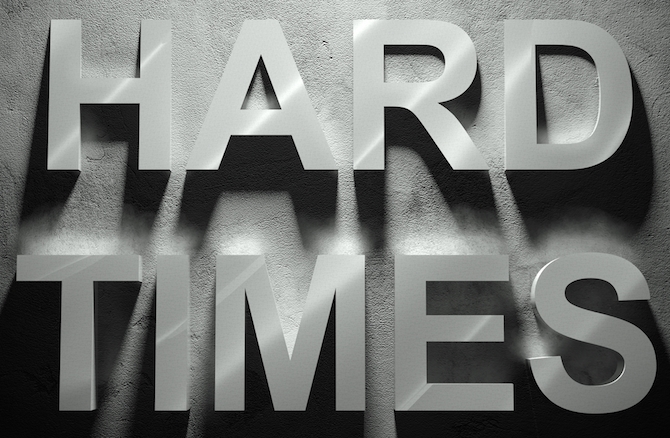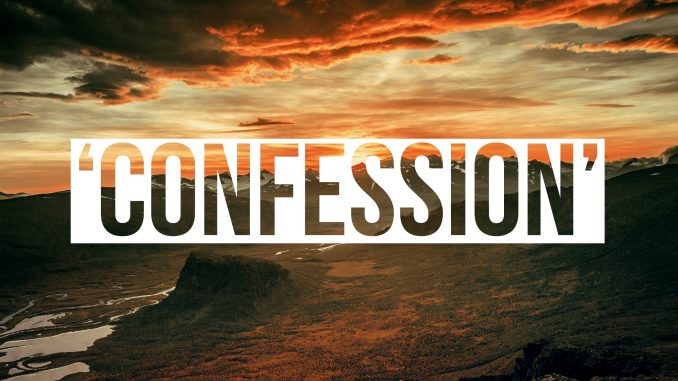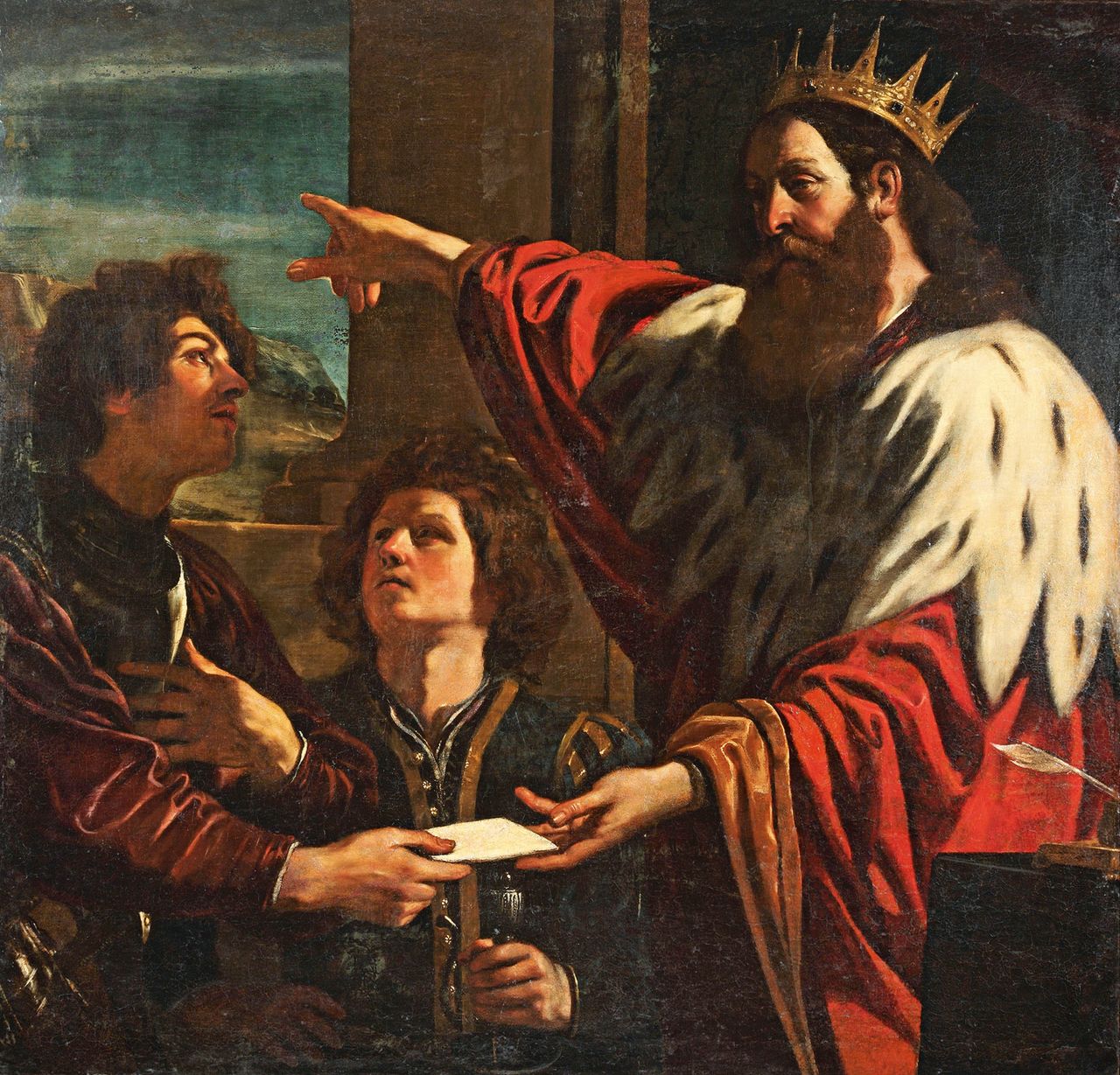Pastor’s Blog
08
Oct '19

Repent of any sin and call on the Lord to restore your Joy– there is nothing like it.
08
Oct '19

“Oh, what joy for those whose rebellion is forgiven, whose sin is put out of sight! Yes, what joy for those whose record the Lord has cleared of sin, whose lives are lived in complete honesty!” (Psalm 32)
Oh, give me back my joy again; you have broken me—now let me rejoice. (Psalm 51:8)
After David sinned, he lost his communion with God. He discovered what many of us do: the pleasure of sin is short lived and deceiving, it brings a flood of emotion for the moment but leaves us empty and sick at heart. When the initial excitement wears off, we often feel isolated and numb.
After David faced the truth of his sin, he no doubt fell into despair. As we all do, he faced negative thought like; “After what I did, how can I ever face my family again? How can I lead other people when I can’t be trusted with myself? God, I don’t deserve your love, grace, or blessing.” Many of us can identify with his anguish. David was broken but he believed God could restore him. So what does he ask God for? Joy– Why?
Joy is more than being happy again. Happiness is based on our surrounding circumstances. Joy is more than feeling optimistic about life. Joy goes much deeper it is a spiritual emotion, it is that deep sense of delight and satisfaction that comes from knowing and being in right relationship with God. (it can’t be experienced any other way)
It is the solid place where we know God is in control, that He is good, and that He is close/present.
David knew that his life was not complete without God this is why he spoke of Joy 70 times in the Psalms. What about you? Repent of any sin and call on the Lord to restore your Joy– there is nothing like it.
In His Service,
Eric Barnes
23
Sep '19

When hard times come!
23
Sep '19

In this you greatly rejoice, though now for a little while if need be, you have been grieved by various trials, that the genuineness of your faith, being much more precious than gold that perishes, though it is tested by fire, may be found to praise honor, and glory at the revelation of Jesus Christ.
(1 Pet. 1:6-7)
God knows when we face tough times. He hears our cries. We know this but even the most faithful of us sometimes feel despair and hopelessness.
Many times God allows us to face these circumstances to strengthen our faith; it forces us to seek after God to find strength and refreshment. He knows our emotions, our needs and our desires. He also knows exactly what it will take to get you into an intimate relationship with Him. Remember this is God’s great goal for us to be in an intimate relationship with Him, if this is what we desire as well He will use all means to bring us to that place of intimacy—even hardship or trial.
The early church faced great trial and God used Peter to address them in their time of hardship. Peter explained that they could rejoice even in times of trial because of Jesus Christ, the living hope within them- their risen Savior and Lord (1 Pet. 1:3). Jesus protects them by the power of God (v.5). With Jesus no situation is hopeless.
Even if you find yourself in a seemingly hopeless situation, know that God has an entirely different view of the details. He can take your life, no matter how broken and make it beautiful. This is what hope is all about, beauty for ashes, gladness instead of sorrow, and a coat of praise instead of fainting (Isa. 61:1-3). This is the ongoing ministry of Christ in our afflictions. So take him your sorrows, and He will restore your hope.
In His Service,
Eric Barnes
18
Sep '19

Then David confessed to Nathan, “I have sinned against the Lord.” 2 Samuel 12:13
18
Sep '19

Veteran police detectives are so good at getting people to confess to crimes because they know a simple truth: the human heart wants to confess. The human heart needs to confess. The old saying “Confession is good for the soul” is accurate. Confession frees the heart of the enormous burden of guilt. It lifts the weight of shame off our consciences and allows us to start fresh with the truth.
Nathan pinned David down with the truth when he surprised the king with the words, “You are that man” (2 Samuel 12:7). David heard the voice of God in those words, and he realized that his sin was found out. The king did what we all must learn to do: He confessed and took responsibility for his actions. He opened his heart to the power of the Holy Spirit and fully understood that he had killed Uriah and hurt Bathsheba. And in the process, a baby also died. David had created victims.
He had sinned against them. But more important, after Nathan confronted him, David recognized that he had sinned against God. David’s sin against God was open rebellion against the way God ordered him to live. When we sin, we also create victims. But we also sin against God. We rebel against His guidelines and go our own way.
When we confess our sin, we are agreeing with God that our sin is rebellion against Him. Our confession keeps us from rationalizing and explaining away our actions. It allows us to begin to repair our relationship with God so that we can walk in relationship with Him. Let us take account of our sins, confess them, and be restored to right relationship. Don’t make God come looking for you.
In His Service,
Eric Barnes
10
Sep '19

David wrote a letter to Joab and gave it to Uriah to deliver. The letter instructed Joab, “Station Uriah on the front lines where the battle is the fiercest. Then pull back so that he will be killed. (2 Sam. 11:14-15)
10
Sep '19

Wow! That was so harsh of David. It was so deliberate, calculated, and premeditated. We need to understand the significance of premeditated sin and apply some truth to our lives.
We understand that premeditated means planned or thought out. It is not a crime of passion that just happens. It is thought out, designed, and carried out. That’s why the punishment for premeditated murder is greater than the sentence for manslaughter.
Premeditated sin is more harmful to our spiritual life and is a huge deal to God. Intentional sin reveals a heart that is in open rebellion against God! Rebellion denies our relationship with God and rejects His position of supremacy in our lives. We are taking the place of God at that moment.
When we intentionally sin against God, we are moving in the opposite direction at that point. No longer abiding with God but running away in relationship to Him. The further we willingly run in the wrong directions the longer and rougher our return will be. It’s like running fast down hill and trying to stop your momentum and turn around, the farther and faster you are moving the harder it is to stop.
Willful, calculated sin reveals our hearts have become calloused toward sin. The real problem then is the next time we sin it makes it much easier. Calloused hearts don’t feel the remorse and regret that soft hearts feel.
We must always try to avoid all sin at all cost. However we must be vigilante against deliberate and willful sin. Confess every sin and repent. Confess it not only to God but a Christian brother or sister who will hold you accountable. Let us do everything not to travel on the road that leads away from our relationship with God.
In His Service,
Eric Barnes
27
Aug '19

In the spring, at the time when kings go off to war, David sent Joab out with the king’s men and the whole Israelite army. . . . But David remained in Jerusalem. 2 Samuel 11:1
27
Aug '19

Remember one serious lesson in life: small seeds of sin lead to big sins. From the life of David we can see how his sin started and grew.
David was a successful king. From His position he brought God glory, and he provided security, power, and prosperity to the people of Israel. But he was human and he got tired. For fifteen years he had fought Israel’s enemies. Before that, he killed Goliath and went on the run from Saul for years. Living and sleeping in camps and caves took its toll on David.
When the time came for another war campaign, at this point in his life David decided to stay home. Instead of being a “hands-on” king, he determined that he needed a break. Instead of leading his troops, he sent someone else to do it. He ducked his duty.
In David’s defense, being king was an enormous responsibility. He made the tough decisions, dealt with the military egos, comforted families of fallen warriors, and still functioned as king over the kingdom. Maybe David felt he was entitled to perks others wouldn’t understand.
In His mind he could justify it, he was king! He deserved a break! No one had a clue what a tough thing it was to be king! What we often overlook is the fact that it is these kinds of thoughts that set people up for sin.
Do we do the same thing? Justify. Get lacks. Taking a break. Hear this! Taking a break is fine, but shirking our duty is not. As Christians, kingdom workers, do we ever blow off a Sunday, feeling we’ve done enough for a while? We think everyone else gets a break, I’ve paid my dues, now it is my turn– I’m not teaching this year, or serving on that board or leading that group– I need time for me. Are we coupling self-pity with laziness? Sin is never an only child. Sins are twins. Small sins of our attitude lead to larger sins of action. A little bit of wrong sinful attitude plants the seed for greater sins to grow. It’s only a short hop from God’s will to self-will and sin.
Beware of small sins that lead to bigger ones. What are the little seeds of sin in your heart? What will you do to keep the devil from nurturing them into even bigger sins? Pray about it and take action before it’s to late.
In His Service,
Eric Barnes
20
Aug '19

For the judgment following one trespass brought condemnation, but the free gift following many trespasses brought justification. For if, because of one man’s trespass, death reigned through that one man, much more will those who receive the abundance of grace and the free gift of righteousness reign in life through the one man Jesus Christ (Romans 5:16-17)
20
Aug '19

God demands payment for sin, but He balances His justice with mercy to insure that all sinners including—you and I—wouldn’t be separated from Him forever. A little story will help explain, keeping in mind that God is fully aware of Jesus’ sacrifice and our position.
When a man is arrested, he either hires legal counsel or is assigned a public defender. Everyone needs legal assistance to guide them through the maze of legal rulings and filings. They need a helper—an advocate—who is familiar with the system.
Jesus is our advocate before God the creator/judge. He represents us in God’s courtroom, where God demands justice for sin. Jesus comes before God with a list of the sins we’ve committed. He states that we’re guilty, on all counts, of the sin for which we have been accused. But that’s not the end of our Advocate’s speech. Jesus reminds the Judge that He Himself has already paid for our sins through His death on the cross. Jesus already bore our death sentence for all our sins—current and future.
Jesus reminds the Judge that it isn’t fair to punish us for the sins for which He’s already paid. God accepts Jesus’ death on our behalf, and He declares us “not guilty.” Our record is expunged. When He looks at us and our sin, He sees His sinless Son and His sacrifice.
Because Jesus paid the debt for our sin, God pardons us. He sees us as righteous, blameless, honorable, and upright. We can do nothing to earn this pardon. It’s grace, a free gift Jesus gives us to pardon us from the death sentence brought on by our sin.
However that is not the end, our advocate then brings up another legal ma!er regarding the same client. He then states a ma!er of adoption that needs to be finalized. Our legal advocate states “My client has been offered adoption into your Honor’s own family and he would like to take you up on that offer. Starting today He wants to take on your family name committing His life to your care and leadership. What does your Honor have to say on this matter.” Standing up, the Judge, states that this ma!er has already been finalize, he then slams the gavel, leaves the bench, approaches the restored man saying “it is so good to have you back my son, there is so much I want us to do together”
Oh what a wonderful advocate we have in Christ– Thank God today and don’t waste the new relationship with your Father!
In His Service,
Eric Barnes
13
Aug '19

The Pull of Sin
13
Aug '19

I know I am rotten through and through so far as my old sinful nature is concerned. No matter which way I turn, I can’t make myself do right. I want to, but I can’t. When I want to do good, I don’t. And when I try not to do wrong, I do it anyway. . . . Oh, what a miserable person I am! Who will free me from this life that is dominated by sin?
Romans 7:18-19, 24
A foundation principle about sin is its power. Sin is a strong, dominant force working against our good intentions. Sometimes the driving urge for sex, gambling, drugs, or other rebellion pulls on us like a powerful riptide sucking us out to sea. We struggle in our minds and wrestle with the urges, but we are pulled under by the sheer force of sin (our natural desires).
Afterward, in shame and despair, we cry out to God, saying what the apostle Paul said in the verses above, feeling helpless and in despair over his sin.
Paul understood the power of sin. He was a well-educated man, yet his education did not free him from sin. Paul discovered that trying to battle sin with his own strength did not work. Knowledge alone about God and his ways do not keep us from sin.
That lesson speaks to us today. If we attempt to overcome sin through willpower and biblical knowledge alone, we will fail. If we try not to sin by believing we can do what is right in our own power, we will fail. Only the Spiritual power of the risen Christ in us, the Holy Spirit, has the power to declare victory over sin (see Ephesians 2:4-5). The hymn writer Charles Wesley summarized it well in his hymn “O for a Thousand Tongues to Sing”:
He breaks the power of canceled sin,
He sets the prisoner free;
His blood can make the foulest clean,
His blood availed for me.
If Christ alone holds power over sin, then it is only by relying on His power in us that we may exercise power over sin. Christ alone avails over the power of sin. Acknowledge this truth today, surrender to His leading, and trust in His power– that you may have power over the sin that pull against your life! God bless you and empower you in your fight today!
In His Service,
Eric Barnes
06
Aug '19

Adam’s sin brought death, so death spread to everyone, for everyone sinned. (Rom. 5:12)
06
Aug '19

Do we behave as if there are no consequences for our actions? Do we live as if sin doesn’t exist and that a day of reckoning will never come? If we do, we’re dead wrong. Sin is a big deal to God. When we sin, God doesn’t say, “Well, I’ll knock down your charges to misdemeanors, and you can walk. I’ll ignore your disobedience this time and look the other way.” God hates sin and demands that it be punished.
God told Adam and Eve that if they disobeyed Him, they would die. He’s a God of His word. He followed through on His punishment. Adam and Eve didn’t physically die immediately, but life changed for them. Eve would suffer pain during childbirth and lose the natural equality she shared with Adam in the Garden. God placed a curse on the ground, which meant Adam would struggle and sweat to scratch out a living from it. Work would also frustrate Adam as further evidence of disunity with God. And death became part of their existence. Eventually Adam and Eve would die and return to dust. It was a sad day for Adam and Eve (Genesis 3:16-19). God banished them from the Garden, the ultimate punishment—separation from God. In all fairness, God punished the serpent also. His offspring would eat dust and forever be enemies with Adam and Eve’s offspring, ending in His destruction.
From the moment Adam and Eve disobeyed, every human has gravitated toward sin. Harmony with God and each other was replaced by conflict and discord. God punished Adam and Eve, but in His mercy, He provided a way out of this ultimate death and separation. And that’s what the rest of the Bible is all about: God’s plan to redeem the offspring of Adam and Eve—you and me.
God has already completed the plan of redemption and we can enjoy restored relationship with Him now and forever. However when we become His we should no longer continue our sin pattern. God still hates sin and God cannot bless sin. God still must let the consequences of our sins to play out. Sin is still serious.
Consider your attitude toward sin. Are you serious about it or casual? How does God see your sin? Shouldn’t you have the same view of your sin as God does?
In His Service,
Eric Barnes
30
Jul '19

And remember, no one who wants to do wrong should ever say, “God is tempting me.” God is never tempted to do wrong, and he never tempts anyone else either. Temptation comes from the lure of our own evil desires. James 1:13-14
30
Jul '19

Adam blamed God, in the Garden, when asked if He had eaten the fruit He was not supposed to take. His answer “it was the woman you gave me” placing the blame back on God. We too have a tendency to justify and shift blame to others or God for our sin.
In areas where we’re weak, we look for any excuse to justify what we have already chosen in our hearts to do. Take sexual sin, for example. We blame God for creating us with strong sexual desire, and we rationalize abnormal/deviant sexual behavior by accusing God for “making us this way.” We argue, “Why am I accountable for acting according to the way God made me?”
That argument may sound logical and many of life’s circumstances are beyond our control. We never chose our parents, the color of our skin, our neighborhoods and some might try to argue even our sexual orientation. Many homosexuals feel they were born the way they are. Even if these arguments were true, does this cancel our freedom of choice, and as a result, terminate all personal responsibility? Are we just characters following a predetermined script and not accountable for our actions? If these arguments are true, then why are there prisons? Why did we have to put a stop to a man like Hitler? Jeffrey Dahmer was just born that way. They were all God’s fault, right?
We must never be deceived into believing that because we were born with strong desires in any area that God is to blame for our sin. When we blame God, we’re using Him as an excuse for abnormal and sinful behavior that our own sinful natures desire. The truth is we have a sin nature and we have strong natural desires that tempt us, but we also have a stronger God who created us for good. He never tempts us, and the Word clearly tells us “He will never let us be tempted more than we can bear and that He always provides a way out (escape route) from our sinful temptation” Amazing! Even when our desires are enticing us to do wrong, God is working in us and for us to provide a way to do what is right and good.
All things from God are good. If we abuse God’s gifts to us, He is not responsible for our sin, just as the maker of matches is not responsible for the arsonist crime. We all have the freedom to choose. The choice is always between our natural desires or God’s Holy standard of what is right. We all are responsible for our choices before God. We cannot pervert good, do evil, and blame God for our sinful actions. We must understand this, so we don’t make excuses for our behavior by blaming God. Instead let us come into agreement with God (confess) over our sin and repent (turn in heart and action) of our sinful desire. Let us choose to honor God with the life and gifts He has given us!
In His Service
Eric Barnes
22
Jul '19

When Adam sinned, sin entered the entire human race. (Romans 5:12)
22
Jul '19

Are we all sinful when we are born? Yes. Did God create sin? No, He gave mankind a choice. God isn’t a bully. He doesn’t force us to love Him. God knows that forced affection, like coerced confession, is worthless.
God created a perfect, sinless world. Adam and Eve were created perfectly to interact with God on a personal level. God gave them the ability and freedom to choose to obey or disobey His commands (Genesis 2:16-17). God is not the author of sin, but He did allow the possibility of sin. Before God created Adam and Eve, He offered His angels the same freedom to choose. Satan, Lucifer, was originally one of God’s most powerful angels. But Satan wanted to be God. He rebelled against God and was thrown out of heaven with many other angels [demons] who supported the rebellion ( Isaiah 14:12 and Revelation 12:7-9).
Adam and Eve chose to listen to Satan instead of God. They ate the fruit of the tree that was forbidden (Genesis 3:1-7). God did not tempt them; Satan did (James 1:13-14). God allowed the possibility of evil. God gave Adam and Eve free will and with that, the right to decide. They chose to be disobedient to His command. Because of their decision, sin polluted God’s perfect world.
As a result of the choices Adam and Eve made, we are sinful from the day we are conceived in our mother’s womb (Psalm 51:5) and we continue to struggle with sin even in our Chris”an walk. Selfishness, greed, and rebellion come quite naturally to us humans. We are sinners, and only when we admit that and look for a solution will we find living hope. Our hope is in God’s grace and forgiveness through His Son, Jesus Christ. He alone sets us free from the penalty and the power of sin.
Look at the choices you have made over the years and the choices you are making now. What power are you giving sin in your life? Be honest with yourself and confess all sin, place it under the power of Christ that you might receive victory and hope. Let your life be a testimony to the power of God alive in you through Christ Jesus the Lord!
In His Service,
Eric Barnes
